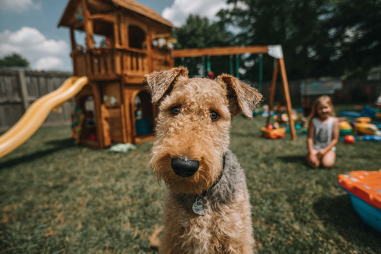Welcoming an Airedale Terrier into your home means sharing many joyful moments as your furry friend grows and thrives. Like any beloved pet, understanding the natural aging process and the typical lifespan of an Airedale Terrier can help you make informed decisions to ensure their comfort and happiness throughout their years. From recognizing the subtle signs of aging to adapting their care routine, being prepared allows you to keep your dog active, healthy, and mentally engaged well into their senior stage.
Average Lifespan of Airedale Terriers
Airedale Terriers generally live between 10 to 13 years, though some may live longer with excellent care and favorable genetics. This lifespan places them in the medium range compared to other dog breeds. Factors such as diet, exercise, genetics, and regular veterinary care significantly influence their longevity. By knowing this typical lifespan, owners can anticipate the different life stages and adapt their dog’s lifestyle accordingly, providing proactive health management and emotional support as your Airedale ages.
Physical and Behavioral Signs of Aging
As Airedale Terriers enter their senior years, usually around 7 to 8 years old, certain physical and behavioral changes start to appear. Physically, you might notice graying around the muzzle and eyes, a slower gait, or less energy during playtime. Their coat may become coarser or thinner, and weight changes—either gain or loss—can become apparent.
Behaviorally, your dog may also exhibit changes such as increased sleep, reduced enthusiasm for activities they once enjoyed, or signs of stiffness after resting. Some older Airedales might show slight cognitive changes, including confusion, less responsiveness to commands, or increased anxiety. Recognizing these signs early is critical to adjusting care and seeking veterinary advice if necessary.
Changes in Dietary and Exercise Needs
Nutrition plays a vital role in aging gracefully. Senior Airedale Terriers typically need fewer calories due to decreased activity levels but require nutrient-dense food rich in antioxidants, omega-3 fatty acids, and joint-supporting supplements like glucosamine. It’s a good idea to gradually transition to a high-quality senior dog food formulated to support aging joints, maintain a healthy weight, and promote organ health.
Exercise routines should also be adapted. While regular physical activity remains essential to keep joints flexible and maintain muscle tone, the intensity and duration might need modification. Gentle walks, swimming, or low-impact play can help prevent obesity and arthritis progression while keeping your dog stimulated and happy.
Health Screenings for Older Dogs
Regular veterinary checkups become even more important as your Airedale Terrier ages. Annual or biannual health screenings can detect early signs of common senior dog ailments such as kidney disease, heart issues, dental problems, and certain types of cancers. Blood work, urinalysis, and possibly imaging tests like X-rays or ultrasounds are tools your veterinarian may recommend to catch problems early.
Staying on top of vaccinations, parasite control, and dental health can significantly improve your dog’s quality of life. Open communication with your vet about any changes in behavior or physical condition ensures timely interventions and personalized care plans tailored to your dog’s unique needs.
Managing Arthritis and Mobility
Arthritis and joint stiffness are common challenges in aging Airedale Terriers. To help manage mobility issues, consider adding joint supplements advised by your veterinarian and maintaining a consistent, gentle exercise routine that supports flexibility.
Environmental adjustments within the home can also make a big difference. Providing orthopedic beds, adding ramps to help your dog climb into cars or onto furniture, and ensuring non-slip flooring can reduce the risk of falls and ease discomfort. Physical therapy or hydrotherapy may be beneficial, offering pain relief and improving strength without straining joints.
Mental Stimulation for Senior Dogs
Keeping your Airedale’s mind active is just as important as physical health. Mental stimulation can help mitigate cognitive decline and maintain a strong bond between you and your dog. Interactive toys, puzzle feeders, basic obedience training, or gentle scent games can keep your dog engaged and sharp.
Additionally, maintaining social interactions, whether with other friendly dogs or humans, prevents feelings of isolation and boredom. Adjust the difficulty and length of activities to match your dog’s energy and abilities, ensuring they remain enjoyable and not stressful.
Grooming Adjustments
Airedale Terriers have a dense double coat that requires regular grooming throughout their lives, but their grooming needs may shift as they age. Older dogs may tolerate grooming sessions less eagerly due to joint pain or sensory changes, so it’s helpful to be gentle and patient.
Frequent brushing will keep the coat clean and help you monitor skin condition for dryness or infections. Trimming nails, cleaning ears, and dental care remain essential parts of grooming to keep your senior dog comfortable and healthy. If grooming becomes challenging, consider professional groomers who are experienced with senior dogs.
End-of-Life Care Considerations
Facing the end of life with your Airedale Terrier is emotionally difficult but planning ahead can ensure their comfort and dignity. Discussing advanced care options with your vet, such as pain management, hospice care, and when to consider euthanasia, helps you make compassionate decisions when the time comes.
Creating a peaceful environment, consistent routines, and plenty of affection keeps your dog emotionally supported. Recognizing when quality of life diminishes is key to minimizing suffering. Support groups and counseling are available to help owners cope with the grief and challenges associated with end-of-life care.
Supporting Quality of Life
The ultimate goal as your Airedale Terrier ages is to maintain the highest possible quality of life. That means balancing medical care, physical comfort, emotional wellbeing, and strong human-dog bonds. Simple actions like providing cozy resting places, continuing familiar routines, and plenty of gentle interaction make a world of difference.
By being attentive to your dog’s changing needs and adapting care accordingly, you ensure their golden years are full of happiness and dignity. Each Airedale is unique, so tailoring activities, diet, and vet visits to your dog’s individual preferences and health status shows your deep love and commitment.
Resources for Senior Dog Owners
Many resources are available to support owners of senior Airedale Terriers:
- Veterinary specialists: Geriatric and orthopedic vets offer expertise focused on aging pets.
- Online communities: Forums and social media groups provide advice, support, and shared experiences.
- Books and guides: Numerous publications cover senior dog health, nutrition, and emotional care.
- Pet care products: Orthopedic beds, joint supplements, and mobility aids designed for older dogs.
- Professional services: Groomers, physical therapists, and pet sitters skilled in senior dog care.
Utilizing these tools helps you stay informed and confident in your ability to provide the best care possible.
Loving Your Airedale Through Every Stage
The journey with your Airedale Terrier is filled with cherished memories, from playful puppyhood to the calm and affectionate senior years. Understanding their lifespan, recognizing the signs of aging, and adapting their care accordingly allows you to honor your dog’s unique needs with compassion and respect. By remaining vigilant, proactive, and loving, you give your faithful companion the gift of a happy, healthy, and comfortable life every step of the way.







